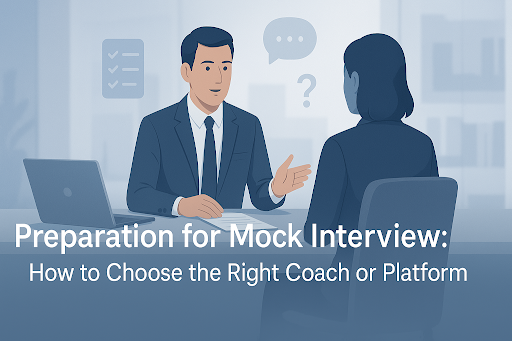
Applying to a top-tier MBA program is no small feat. After months of GMAT preparation, crafting essays, and polishing your resume, you find yourself facing the final and often most unpredictable part of the journey: the MBA interview.
This is where everything comes together—your story, your goals, your personality, and your ability to think on your feet. And while confidence plays a role, success in this high-stakes setting hinges on one key factor: preparation. More specifically, preparation for mock interview sessions that mimic the real thing and help you perform at your best.
But with so many platforms and coaches offering mock interview services, how do you choose the one that’s right for you?
This article breaks down everything you need to know—from understanding the value of mock interviews to choosing between peer-based and professional platforms and knowing what red flags to avoid. Let’s get into it.
Why Mock Interviews Are Critical for MBA Applicants
Mock interviews simulate the real experience in a controlled setting. They give you a chance to test your content, tone, pacing, and structure in response to tough, often open-ended questions. Most importantly, they expose gaps in your delivery that you might not even be aware of.
Here’s why mock interviews should be a core part of your MBA admissions strategy:
- They help refine your narrative. You’ve already written your essays, but articulating your story aloud is a different challenge.
- They replicate pressure. Even confident speakers can stumble when asked something unexpected by a stone-faced interviewer.
- They build composure. Repeated practice allows you to stay calm, structured, and intentional—qualities every top B-school looks for.
Option 1: Peer Mock Interviews
Many MBA candidates turn to peer-based preparation, especially through active communities like GMAT Club, Reddit MBA forums, or local MBA prep groups. In these settings, applicants conduct interviews for one another and provide mutual feedback.
Advantages of Peer Mocks
- Cost-effective (often free) – Great for early-stage practice without financial pressure.
- Flexible scheduling – Set up sessions with fellow applicants at your convenience.
- Observational learning – Watching others answer and receive feedback sharpens your own awareness.
Limitations to Consider
- Limited depth of feedback – Your peers are also learning and may not catch subtleties or weaknesses in delivery.
- Potential bias – Friends might hesitate to give truly honest or critical input.
- Lack of structure – The mock interview may not follow the specific format used by your target school.
Best for: Initial confidence-building and story-testing in a low-pressure environment.
Option 2: Professional Mock Interview Services
Professional mock interview providers, including admissions consultants and former B-school alumni, offer a more structured and school-specific approach. These services are often tailored to your application and provide targeted coaching based on institutional expectations.
Advantages of Professional Coaching
- School-specific insights – Many professionals have experience with admissions at particular schools and tailor their questions accordingly.
- Deep, actionable feedback – Sessions often include detailed commentary on body language, structure, and delivery.
- Realistic pressure simulation – Some services mirror the exact format of schools, such as Harvard’s blind interview or Wharton’s team-based discussion.
Limitations to Keep in Mind
- Cost – Professional services can range from $100 to $400+ per session.
- Variable quality – Not all platforms are equal. Some focus too much on rehearsed scripts rather than dynamic thinking.
- Availability – Top-rated consultants may have long waiting lists during peak season.
Best for: Final-stage prep when stakes are highest and precision matters.
Checklist: How to Vet a Mock Interview Coach or Platform
Choosing the right mock interview partner should be as strategic as preparing for the interview itself. Use the following criteria to evaluate:
| Criteria | What to Look For |
| Experience | Have they worked with applicants to your target schools (e.g., HBS, INSEAD, Kellogg)? |
| Interview Format | Can they replicate the real format—panel, blind, application-based, or team-based? |
| Feedback Quality | Will you receive detailed, structured insights on content and delivery? |
| Recording Access | Can you watch a replay of your performance for self-review? |
| Customization | Are sessions tailored to your story, resume, and essays? |
| Reviews/Testimonials | Can you verify results from previous clients (on GMAT Club, LinkedIn, etc.)? |
| Trial Session Option | Some offer discounted first sessions—use them to test fit. |
Questions to Ask Before Booking Your First Session
Don’t be afraid to interview your interviewer. Before committing, ask these essential questions:
- “Have you coached successful candidates for my target school(s)?”
- “What type of interview formats do you specialize in?”
- “Do you provide post-session notes, recordings, or next steps?”
- “What’s your process for customizing questions to my background?”
- “Do you offer packages with feedback over time, not just one session?”
A truly professional coach won’t mind these questions—in fact, they’ll appreciate your seriousness.
Combining Both Approaches for Maximum Impact
Many applicants make the mistake of thinking they need to choose either peer mocks or professional prep. The truth is: a blended strategy works best.
Here’s a recommended progression:
- Start with peer mocks to test your content, reduce nervousness, and get used to hearing yourself speak.
- Graduate to professional mocks once your answers feel refined and you’re ready to simulate a real high-pressure scenario.
- Use feedback iteratively – refine answers, adjust body language, and rehearse unpredictable follow-ups.
Final Thoughts: Your Interview Is Your Moment—Own It
While essays and test scores get you in the door, the interview is your live audition—a dynamic, human moment where your authenticity and clarity of thought must shine through.
Effective preparation for mock interview is not just about repetition. It’s about intentional practice, tailored feedback, and the right level of challenge to push you beyond your comfort zone.
Whether you opt for peer-led practice or invest in a professional platform, ensure that your choice aligns with your needs, school targets, and personal growth goals.